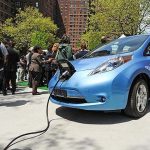ISLAMABAD: An electric vehicle policy came up for discussion on Monday, and persistent differences in views between commerce ministry and climate change ministry continued to mar the smooth passage of the policy.
The meeting presided over by Adviser to the Prime Minister for Commerce, Investment and Industries & Production Abdul Razak Dawood was attended by Minister for Science and Technology Fawad Chaudhry, Adviser to the PM on Climate Change Malik Amin Aslam and Adviser to the PM on Institutional Reforms and Austerity Dr Ishrat Husain.
The meeting decided that the focus of electric vehicles in Pakistan should be initiated with two wheelers (motorcycles) and three wheelers (auto rickshaws), which would satisfy the concerns of both the ministries.
“Shifting to e-motorcycles was easier as it has been witnessed in middle class markets like China,” said an official of the ministry of climate change, who participated in the meeting, adding, “Besides, Pakistan has a very large number of motorcycles, motorcycle rickshaws and auto rickshaws that emitted a significantly huge amount of smoke.”
The issue of electric four wheelers (cars) would be taken up at a later stage, however the ministry of climate change stressed one per cent duties on imports of parts for assembly of e-motorcycles and e-auto rickshaws.
The ministry of climate change maintained that the low duties would encourage e-bikes at a faster rate, however the ministry of industries argued that it would discourage local production of parts.
Currently, the import duty is 46 per cent on two wheelers and three wheelers’ parts manufactured in the country and 15pc on imported parts.
The officials of the ministry of industries maintained that Pakistan has a strong production base and almost all parts of two wheelers and three wheelers are manufactured locally, so the existing makers should encouraged to shift from oil to battery-based vehicles.
The meeting witnessed diversified views mainly among the initial paperwork between the ministry of climate change and the ministry of industries.
Mr Dawood said that a comprehensive policy has to be designed in consultation with stakeholders, and it was also the government’s existing effort to attract investment in the auto sector of Pakistan.
The meeting agreed that a fair and transparent policy is essential for consumers and investors.
It noted that electric vehicle policy was the need of the hour, particularly because of its impact on environment, but its success would depend on promoting local production and assembly, while ensuring safety standards.
The meeting agreed that the existing auto sector policy will be allowed to function to maintain the government’s continuity of policies and to build the confidence of investors.
The federal cabinet had established the committee last week to finalise the policy after a tussle between the Industries and Production Division and the Ministry of Climate Change.
Published in Dawn, April 7th, 2020





